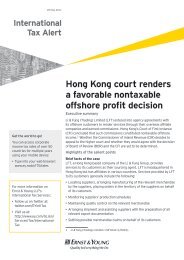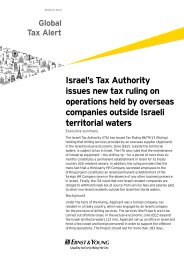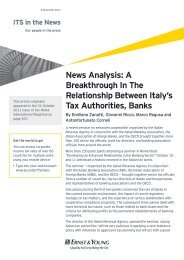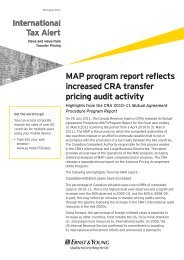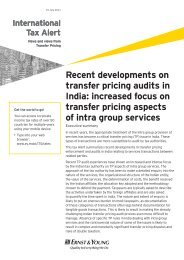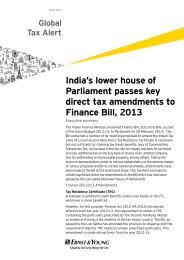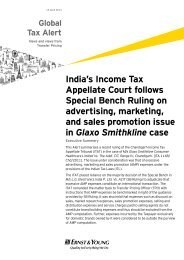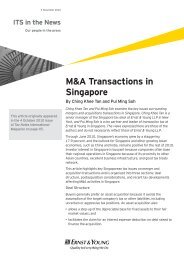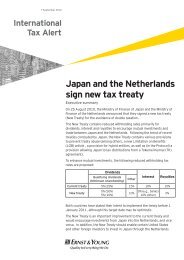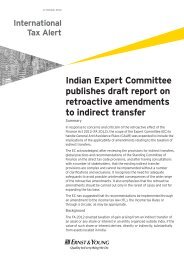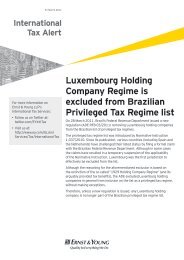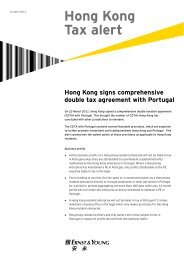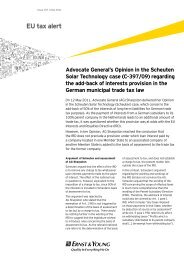Download - Ernst & Young T Magazine
Download - Ernst & Young T Magazine
Download - Ernst & Young T Magazine
Create successful ePaper yourself
Turn your PDF publications into a flip-book with our unique Google optimized e-Paper software.
Credit: Reuters / Handout, Iron Ore Company Canada<br />
Carlos Ghosn, the Brazilian-born Chairman and CEO of the<br />
Renault-Nissan Alliance splits his time between Tokyo and Paris.<br />
He holds both Brazilian and French citizenships.<br />
One difficulty facing companies, however,<br />
is that the goals outlined above are not<br />
complementary, and can even be contradictory.<br />
To give one example, a person sent primarily to<br />
learn about a foreign market may encounter a<br />
completely different set of tasks and<br />
responsibilities from one sent to plug knowledge<br />
gaps. To get the full benefit of such assignments,<br />
says Ms Steele, companies have to aim for global<br />
executives to do both teaching and learning.<br />
However, as she says, most businesses do<br />
neither. “Doing neither has a cost. Doing both is<br />
not difficult but it does require planning.”<br />
Comprehensive planning, though, is too often<br />
absent when executives are sent abroad because<br />
very few companies approach such activity<br />
holistically. Instead, foreign placements are<br />
frequently driven by an ad hoc desire of an<br />
individual business unit. <strong>Ernst</strong> & <strong>Young</strong> research<br />
shows, for example, that human resources<br />
departments play little role in helping to decide<br />
who would benefit most from going abroad – for<br />
nearly 6 in 10 companies, global mobility<br />
professionals are not involved at all in candidate<br />
selection. “People aren’t always looking<br />
strategically. Instead they are looking tactically<br />
and short term,” says Ferrigno. “There is a<br />
massive difference between companies who treat<br />
transfers as a way to invest in people and those<br />
who see them as a way to fill positions.”<br />
The first step, then, toward getting the most<br />
benefit out of international placements is for<br />
Zoë Yujnovich, the Australian-born President and CEO of Rio Tinto’s<br />
Iron Ore Company of Canada, built her career in roles within<br />
the company’s operations in Australia, the UK, US and Brazil.<br />
companies to recognize the multiple objectives<br />
involved and to try and align the varying interests<br />
of distinct parts of the organization around<br />
meeting as many of them as possible. But the<br />
million-dollar question, says Schupp, is working<br />
out how to bring this together. This is especially<br />
true amid the tension between business units<br />
and HR in trying to align strategies. “You get<br />
pressure from business units to quickly fill the<br />
open positions. To maximize the value of an<br />
assignment, the best thing to do is to get the two<br />
groups to sit at the table together to begin to<br />
understand each other and collaborate on how to<br />
meet the multiple objectives they each have,”<br />
says Schupp. “It sounds simple, but many<br />
organizations have a difficult time doing that.”<br />
One way that some companies have found to<br />
improve cooperation is to fund international<br />
postings jointly, especially of junior executives. In<br />
this model, the budget is split between the<br />
receiving business unit and corporate level<br />
training funds, as both parties have an interest in<br />
the assignment.<br />
Such alignment allows a coherent approach to<br />
another crucial element of success: defining how<br />
each assignment will benefit the business and<br />
what is expected of the executive. Millward<br />
Brown’s Steele notes, “Every transfer is looked at<br />
individually and as part of a broader strategic<br />
plan.” Not only are executives properly prepared,<br />
but corporate expectations are made explicit.<br />
Being very clear about why you are sending<br />
Global executives<br />
The highly globalized<br />
operating environment of<br />
today is increasingly<br />
demanding leaders with a<br />
suitably international<br />
background and CV, in order<br />
to more effectively manage<br />
multinational teams and<br />
organizations. Executives<br />
such as Renault-Nissan’s<br />
Carlos Ghosn or Rio Tinto’s<br />
Zoë Yujnovich may once<br />
have been the outliers, but<br />
a growing number of<br />
companies are now actively<br />
working to develop new<br />
leaders with similarly global<br />
backgrounds.<br />
<strong>Ernst</strong> & <strong>Young</strong> Issue 07 T <strong>Magazine</strong> 11



